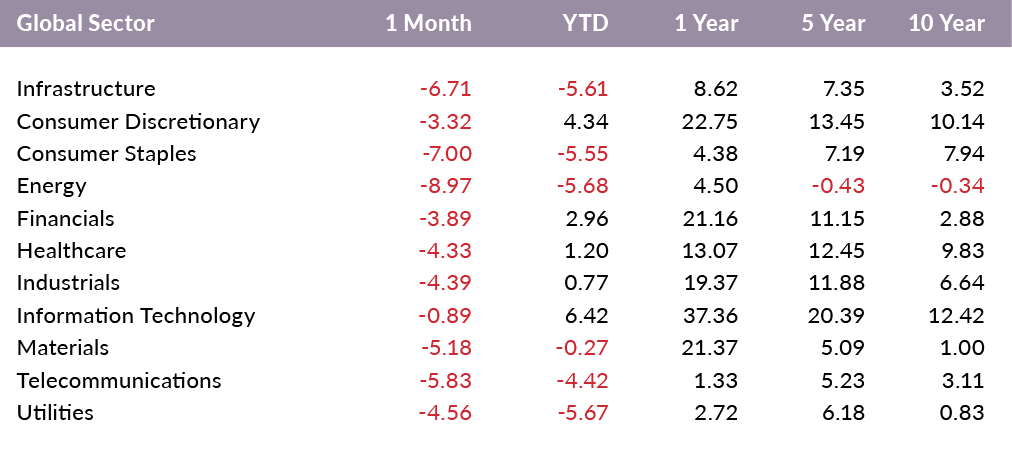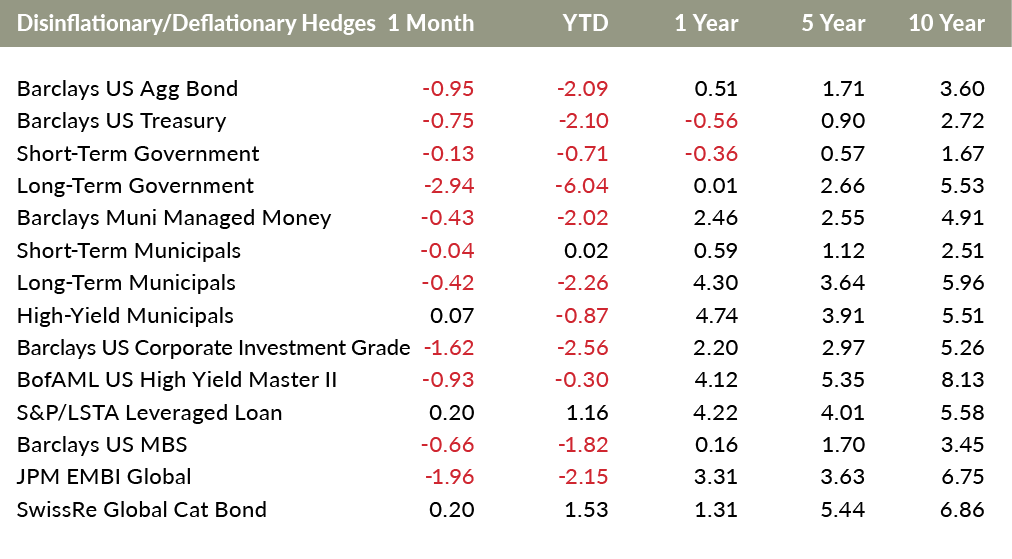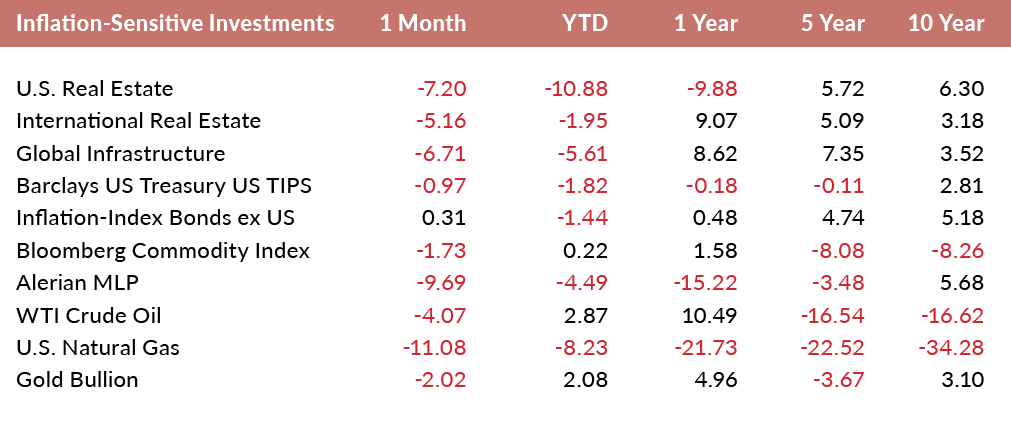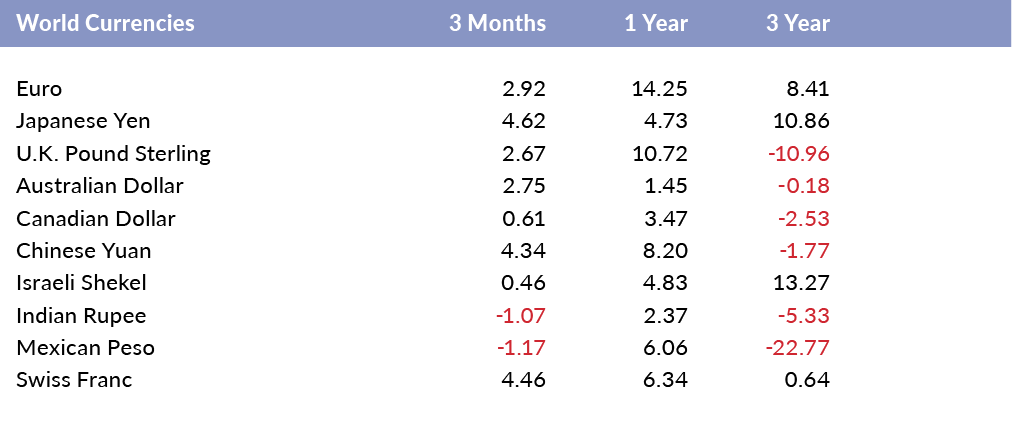Prepared by Brandon Yee, CFA® & Tom Connelly, CFA®

Commentary
Developed Markets Sell Off– In the month of February, developed markets gave up most of their January gains. The Pacific region recorded the strongest relative performance, losing less than other markets. Japan is still up 3% for the year. Canada and the UK posted the largest losses of -7.33% and -6.40%, respectively. Higher market volatility also reappeared after a steady 2017.
 Commentary
Commentary
Emerging Markets Drop in February – Broader emerging markets dropped 4.21% in February. Russia recorded a gain of 0.93% while other countries suffered similar losses to the developed markets. Emerging markets are up 4.29% for the year, with Brazil and Russia leading the way. India and Korea have losses of -3.49% and -2.95%, respectively, through the end of February. Emerging markets have proven to be resilient as their developed market counterparts have mostly flat or negative returns in 2018 so far.

Commentary
Infrastructure Records Sizable Loss– Information technology and consumer discretionary posted the lowest losses of -0.89% and -3.32%, respectively. Energy and consumer staples dropped the most in February. Infrastructure dropped by 6.71% even though infrastructure spending is at the forefront of policy discussions. In a rising rate environment, the financial sector may get a boost.

Commentary
Growth Continues Relative Outperformance– In February, growth outperformed value while momentum recorded a loss of -3.53%. Given the U.S. is in the later stages of the business cycle, growth’s outperformance isn’t entirely unexpected, but investors with longer time horizons should still expect a value premium as history suggests.

Commentary
Momentum Falls Back During Volatile Month– In the international developed markets, value underperformed growth for the month. International small-cap equities outperformed large-cap equities. Momentum posted a loss of -3.91%. The outperformance of growth versus value is less drastic than the U.S. numbers.
 Commentary
Commentary
Inflation Picks Up– Both money market funds and T-Bills still have low yields, but savers may benefit more as rates rise. The CPI increased by 0.54%. Inflation worries have picked up as the business cycle matures.

Commentary
Deflationary Hedges Mostly Lower – The returns of deflationary hedges were mostly negative in February. Leveraged loans and catastrophe bonds had the highest returns, both up 0.20%. Long-term government bonds and emerging market bonds dropped the most during the month. Traditional fixed income will face headwinds from central banks continuing to tighten and potentially higher inflation. Alternative fixed income sources may prove to be useful in this environment.

Commentary
Energy Related Investments Sharply Lower– Inflation-sensitive investment returns were sharply lower in February. Domestic and foreign inflation-indexed bonds had the best relative returns. Natural gas and the Alerion MLP were sharply lower, with each dropping approximately 10%. Unexpected inflation is still a risk as the U.S. is in the later stages of the business cycle and the past quantitative easing by the major central banks has yet to produce many consequences.

Commentary
U.S. Dollar Depreciates Against Other Major Currencies– Over the past three months, the U.S. Dollar depreciated against most other major currencies. The Japanese Yen and Chinese Yuan gained the most ground. The Mexican Peso and Indian Rupee each depreciated about 1% relative to the U.S. Dollar during the same time period.
[mk_fancy_text color=”#444444″ highlight_color=”#ffffff” highlight_opacity=”0.0″ size=”14″ line_height=”21″ font_weight=”inhert” margin_top=”0″ margin_bottom=”14″ font_family=”none” align=”left”]Disclosure: Please remember that past performance may not be indicative of future results. Different types of investments involve varying degrees of risk, and there can be no assurance that the future performance of any specific investment, investment strategy, or product (including the investments and/or investment strategies recommended or undertaken by Versant Capital Management, Inc.), or any non-investment related content, made reference to directly or indirectly in this newsletter will be profitable, equal any corresponding indicated historical performance level(s), be suitable for your portfolio or individual situation, or prove successful. Due to various factors, including changing market conditions and/or applicable laws, the content may no longer be reflective of current opinions or positions. Moreover, you should not assume that any discussion or information contained in this newsletter serves as the receipt of, or as a substitute for, personalized investment advice from Versant Capital Management, Inc. To the extent that a reader has any questions regarding the applicability of any specific issue discussed above to his/her individual situation, he/she is encouraged to consult with the professional advisor of his/her choosing. Versant Capital Management, Inc. is neither a law firm nor a certified public accounting firm and no portion of the newsletter content should be construed as legal or accounting advice. If you are a Versant Capital Management, Inc. client, please remember to contact Versant Capital Management, Inc., in writing, if there are any changes in your personal/financial situation or investment objectives for the purpose of reviewing/evaluating/revising our previous recommendations and/or services. A copy of the Versant Capital Management, Inc.’s current written disclosure statement discussing our advisory services and fees is available upon request[/mk_fancy_text]
